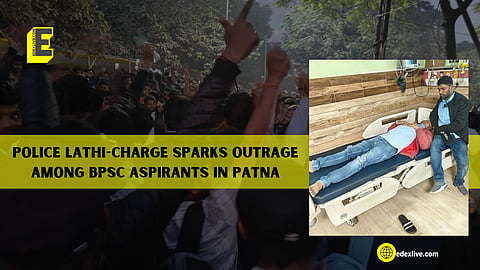

Chaos erupted on Patna's Bailey Road today, Friday, December 6, as hundreds of Bihar Public Service Commission (BPSC) aspirants, demanding clarity and fairness in the upcoming Integrated 70th Combined (Preliminary) Competitive Examination, faced a brutal police lathi-charge.
The protests stem from apprehensions about the introduction of normalisation of marks and a shift to multiple question paper sets for the December 13 examination, which could potentially disadvantage students. Several were injured in the clashes, including student leader Dileep Kumar, who accused the authorities of orchestrating violence to suppress their voices.
"Equal questions for all": Aspirants' key demand
Aspirants have expressed strong opposition to BPSC’s alleged plan to introduce three different question paper sets, with distinct questions rather than shuffled sequences. Dileep Kumar, the injured student leader, explained why this change is contentious.
"We demand fairness. If different question sets are used, variations in difficulty will inevitably creep in. BPSC has a history of issuing incorrect answers in its keys, creating further problems. Normalisation of scores, instead of fixing these issues, often compounds the disparities," he said.
Citing examples of previous exams, Kumar accused coaching mafias of benefiting from such systems, alleging manipulation of results to favor influential candidates. "This isn’t just about one exam. It’s about protecting the integrity of the system. Protests like these forced Uttar Pradesh and Bihar to abandon similar plans in the past, and we’ll fight until BPSC does the same," he said with determination.
Police brutality shocks protesters
The situation escalated when aspirants sought to meet BPSC officials to discuss their demands. Kumar recounted the events, alleging that police turned violent without provocation.
"Despite my medical history, including surgery for a tumour, they hit me on my head and ears, even tried to strangle me. Many others, including women, were assaulted," he claimed.
Aditya, another aspirant, questioned the need for such force. "We were peacefully demanding an official denial of normalisation. Instead, we were met with lathis. How can normalisation even work for general knowledge or social sciences? It’s a flawed system that benefits coaching mafias while ruining the future of honest aspirants," he said.
Women aspirants speak out
The brutality extended to female protesters, sparking outrage. Sugupta, one such aspirant, described her ordeal with visible anger. "We’ve been here since morning, raising slogans peacefully. Yet, male police officers attacked us. Who gave them the right to touch us? Where were the female constables?" she asked.
She also dismissed the authorities’ claims that the protesters were "non-serious" candidates. "I’ve been preparing for two years, paying exorbitant rents and coaching fees as a farmer’s daughter. Does that make me non-serious? The real 'serious' candidates are apparently the rich and powerful, whose selection is already guaranteed," she said, her voice breaking with emotion.
Aspirants accuse BPSC of ignoring concerns
Adding to their frustrations is the lack of dialogue. Kumar revealed that a promised meeting with BPSC officials on November 15 never materialised.
Aspirants now feel abandoned by the system. "We’re left with no choice but to protest. If we don’t fight for our rights, who will?" he said.
Calls for accountability
The protesters are firm in their demands: no normalisation of marks, a single-question paper format, and immediate accountability for the violence. As the December 13 exam date approaches, aspirants are demanding action from the government and BPSC to ensure transparency and fairness.
The violent suppression of peaceful protesters has drawn sharp criticism from aspirants and onlookers alike. "This isn’t just about an exam. It’s about justice, transparency, and the future of meritocracy," Kumar concluded.
With mounting pressure, all eyes are now on the BPSC and the Bihar government. Whether they choose to listen to the aspirants or persist with their plans could have far-reaching implications — not just for this examination, but for the credibility of the system as a whole.
